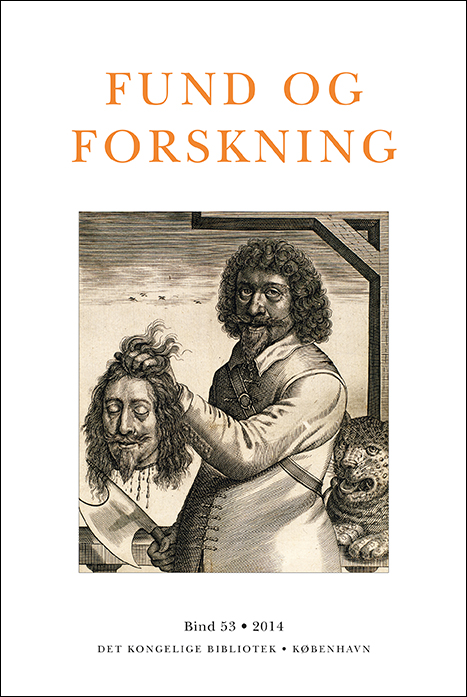Blandt talende statuer og manende genfærd. Mazarinader i Det Kongelige Biblioteks samlinger
DOI:
https://doi.org/10.7146/fof.v53i0.118825Abstract
Anders Toftgaard: Amongst speaking statues and admonishing ghosts. Mazarinades in the collections of The Royal Library
Mazarinade is a term for political writing that was published in different forms in France during (and related to) the Fronde (1648–1653). The Fronde was a series of civil wars that first broke out when Louis XIV (born 1638) was still a child, and Mazarin was the Chief Minister of France and responsible for the young king’s education. Mazarin governed the country together with the king’s mother, Anne of Austria. The term mazarinade covers pamphlets, letters, official documents, burlesque poetry, sonnets and ballads, discourses and dialogues.
The Royal Library in Copenhagen holds a collection of mazarinades. The Copenhagen collection was overlooked by scholars and Hubert Carrier (who travelled widely) because it had not been properly catalogued. The collection of mazarinades in the Royal Library has now been catalogued by the author of the article, and the catalogue is available in Fund og Forskning online. The article serves as an introduction to this hitherto unknown collection of mazarinades. After a presentation of the Fronde, and the term mazarinade and its denotation, the article lists the rare and unique mazarinades in the collections of The Royal Library, Copenhagen and where possible, traces their provenance.
The collection consists of 33 volumes of mazarinades that have been put together in the 19th century in order to form a single collection: Collection de mazarinades. Apart from this Collection de mazarinades there are other mazarinades in the holdings, stemming both from the Royal Library and from the University Library.
The 33 volumes (one volume has been missing for years) have been grouped together by various subsets. One of these subsets is a collection of mazarinades created by Pierre Camuset, who lived during the time of the Fronde. Camuset introduces himself as “conseiller du roi, eslu en l’election de Paris”. Archival records show that he was appointed to this position on 9 December 1622, that in 1641 he married Agnès, daughter of Jean Le Noir, lawyer to the Parliament of Parisian, and that he died some years before 1670.
In the Collection de Mazarinades, there are approx. 100 mazarinades which were considered rare or “rarissime” by Célestin Moreau in his Bibliographie des mazarinades (1850–1851). There are three mazarinades, which would seem to be unique; three mazarinades, which are not recorded in the existing bibliographies of mazarinades (made by D’Artois and Carrier, in the Bibliothèque Mazarine) but of which there are copies in other libraries. There is a mazarinade printed by Samuel Brown in The Hague, which has not been recorded elsewhere. Finally, there are 11 mazarinades printed by Jean-Aimé Candy in Lyon, of which only three, judging from existing catalogues and bibliographies, seem to exist in other libraries.
Only few of the mazarinades were brought to Denmark during the Fronde. Most of them were collected by Danish 18th century collectors. Surprisingly, only a small part stems from the incredibly rich library of Count Otto Thott (1703–1785). When Thott’s library was auctioned off, his mazarinades were bought by Herman Treschow (1739–1797) who acted as a commission agent for numerous book collectors, and due to the detailed cataloguing in Thott’s auction catalogue, it would probably be possible to find the volumes from his library in a foreign library.
Both Hans Gram (1685–1748) and Bolle Willum Luxdorph (1716–1788) owned copies of Gabriel Naudé’s Mascurat in which they wrote handwritten notes. Luxdorph was the great collector of Danish press freedom writings. In his marginal notes he compares a passage in Naudé’s text about common people appropriating the art of printing with his own experience of a servant who came up with songs that were “assez mechants” during the fall of Struensee on 17 January 1772: “Mon valet faisait aussi d’asséz méchans vers su aujet de la revolution du 17de janvier 1772”. Luxdorph’s reading of Mascurat is thus in close connection with his interest in writings on press freedom.
The Mazarinades are valuable both for studies in history, literary history and history of the book. More specifically, the collection of Mazarinades in the Royal Library, on the one hand, through the example of Pierre Camuset, shows how an individual tried to get a grasp of an abnormal period, and on the other hand, through the example of Luxdoph, very clearly testifies to the 18th century interest in the history of the book and in historical periods with de facto freedom of the press.


